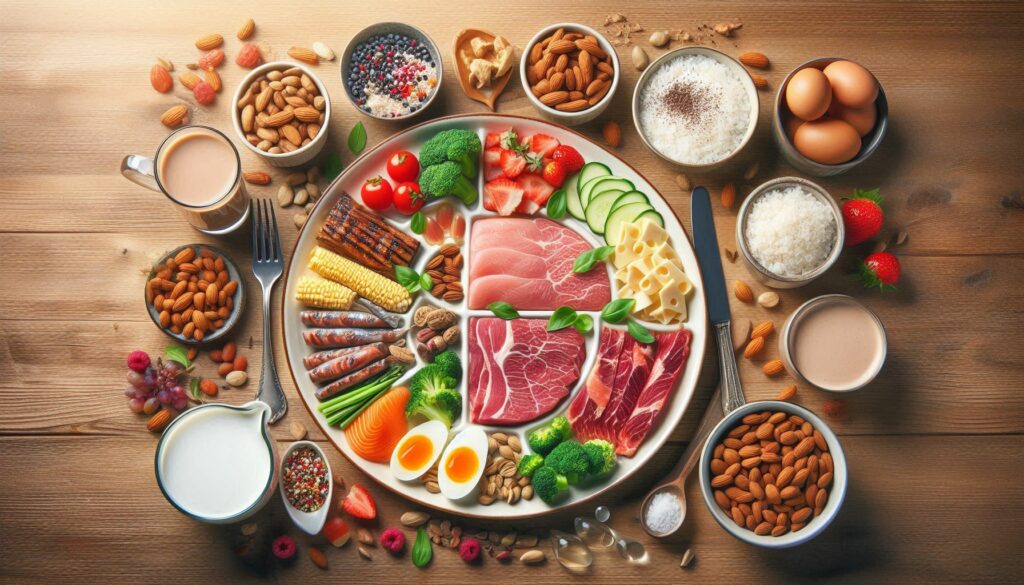Beginner’s Ultimate Guide: Meal Plan for Weight Training
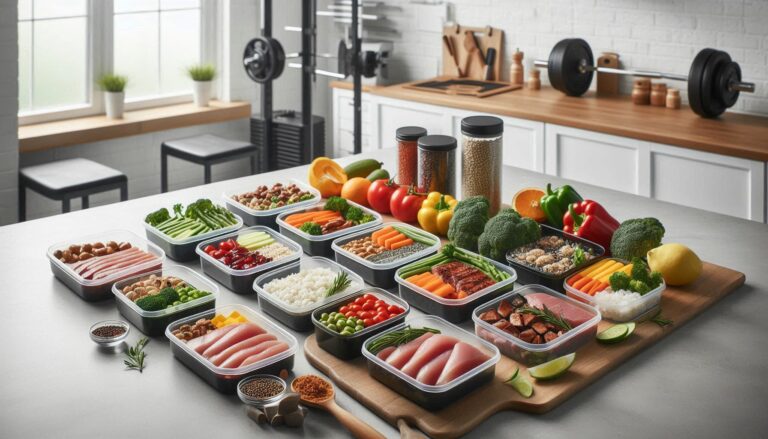
Key Highlights
For anyone looking to build muscle and get into weight training, having a good meal plan is super important. You’ve got to make sure you’re eating enough protein since it’s really important for your muscles to grow. Depending on what you want to achieve and how much you move around during the day, how many calories you eat might need some tweaking.
When it comes down to working out, don’t forget about strength training; it should definitely be part of your exercise routine. It’s also crucial that your meals have a nice mix of proteins, carbs, and healthy fats if you want the best results from your workouts.
Sticking with your meal plan consistently is key if reaching those weight training goals is what you’re aiming for.
Introduction
When it comes to lifting weights, having a meal plan is super important and shouldn’t be ignored. No matter if you’re aiming to get bigger muscles, become stronger, or just want to be fitter overall, the right meal plan can really help you move forward and see better results.
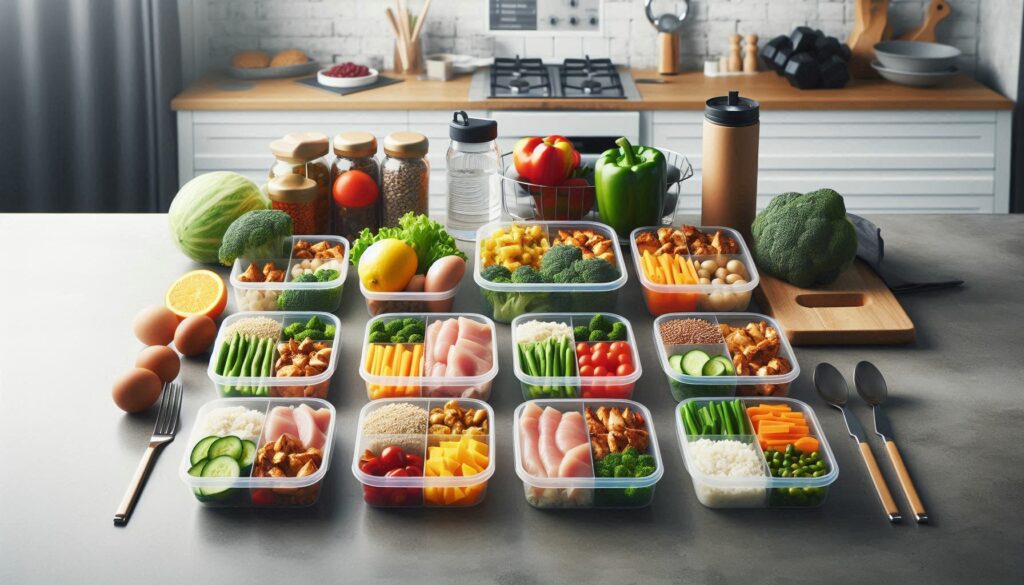
Lifting weights means you’re putting your muscles under stress with different exercises so they grow and get stronger. But if your eating habits aren’t up to scratch, all that hard work in the gym might not show much progress. That’s where having a good meal plan steps in.
By setting up a meal plan that matches what you want to achieve, your body gets better at building muscle, recovering after workouts, and giving you enough energy for all those exercises. A balanced meal plan makes sure you eat the right stuff at the best times for muscle growth while keeping your energy levels high and helping out with general health too.
In this guide meant for beginners on how to make a meal plan when weight training we’ll cover basic things about planning meals why eating right matters so much for growing muscles which nutrients are most important when lifting weights plus I’ll walk through how anyone can create their own personal food schedule Whether starting fresh or trying to improve what already doing this information aims to give everything needed nail down nutrition side reach fitness dreams
Understanding the Basics of Meal Planning for Weight Training
Before we jump into the nitty-gritty of planning meals for weight training, it’s key to grasp the basics. When you’re meal planning for weight training, you’re essentially setting up a structured plan that meets your nutritional needs, helps with your body weight goals, and aids in muscle growth.
Nutrition is super important when it comes to building muscle. Your body needs a mix of macronutrients like proteins, carbs, and fats to effectively build muscle. These nutrients are crucial because they give your muscles what they need to grow stronger and recover after workouts.

When putting together your meal plan, it should be customized based on what you want to achieve and where you stand with your body weight. If gaining muscle mass is what you’re aiming for, then eating more calories than usual can provide the extra energy required by your muscles to bulk up. However, if losing some body fat while keeping all that hard-earned muscle is more up your alley; cutting down on calories might be necessary instead.
It’s really about knowing what works best for your body and adjusting things as needed so that reaching those specific goals becomes possible through proper nutrition alongside effective workout routines
The Importance of Nutrition in Muscle Building
When we talk about getting muscles to grow, what you eat is super important for making those muscle cells bigger, a process known as muscle hypertrophy. Muscle hypertrophy happens when your body gets enough of the right nutrients, like proteins.
Proteins are really important because they’re what your muscles need to fix themselves and get bigger. When you lift weights or do any kind of weight training, it actually causes tiny tears in your muscles. Eating the right amount of protein helps fix these small tears and helps your muscles grow.
For anyone looking to build more muscle, eating enough protein is key. How much you need can change based on things like how much you weigh, how active you are, and what fitness goals you have in mind. Usually, people say that taking in about 0.8-1 gram of protein for every pound that someone weighs is good for building muscle but everyone’s different so this might not be perfect for everyone.
To figure out exactly how much protein is best for helping you reach your specific goals, talking with a registered dietitian or nutritionist could be really helpful since they know all about this stuff.
Key Nutrients for Weight Training: Proteins, Carbs, and Fats
When you’re lifting weights and want to get the most out of it, eating right is key. Your meals should have a good mix of proteins, carbs, and fats because they all play a big part in giving you energy and helping your muscles grow stronger. Let’s break down what kinds of foods are best for each:
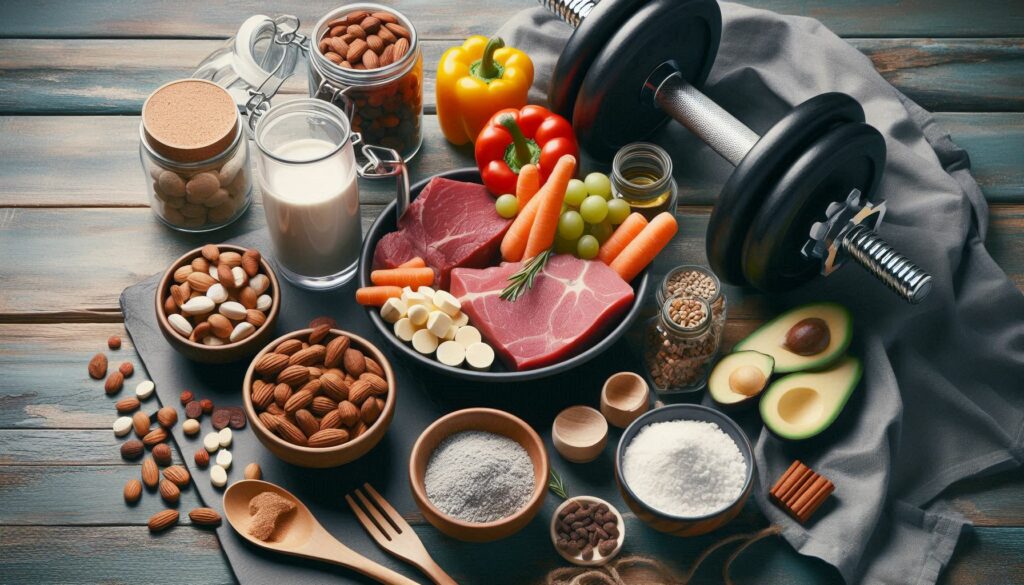
- For proteins, think about adding things like chicken breast, fish that isn’t fatty, lean cuts of beef, tofu, and Greek yogurt into what you eat. They help fix up your muscles after working out and make them bigger over time. If getting enough protein from food sounds tough, shakes or other supplements can be handy too. You’ll want to aim for roughly 0.8-1 gram per pound that you weigh.
- With carbohydrates (or carbs), these guys give you the oomph to power through exercises by keeping muscle glycogen stores full – this basically means more fuel for longer or harder workouts! Go for complex ones like brown rice; whole grains; sweet potatoes; and fruits which keep releasing energy slowly rather than all at once so there’s less chance of crashing mid-workout or feeling sluggish afterward.. Depending on how much moving around or training sessions do plan aim between 1-3 grams per pound body weight.
-On top of that, don’t forget healthy fats either since they’re super important not just making sure hormones doing their job but also overall well-being Include stuff like avocados nuts seeds olive oil especially if enjoy seafood than fatty fish salmon great choice Here target somewhere range 0 .3-.5 gram every pound carry
It’s worth noting though everyone is different What works one person might need tweaking another So always pay attention to how feel and adjust meal plans accordingly based on goals levels activity
Preparing for Meal Planning: What You Need to Know
Before you start planning your meals, it’s important to think about a few things that will help you succeed. Here’s what you should keep in mind:
- Know what you want: It’s crucial to figure out exactly what you’re aiming for with weight training and building muscle. Do you want more muscle mass, less body fat, or just to get stronger and fitter? Knowing your goals makes it easier to plan your meals.
- Figure out how many calories you need: Based on what your aims are and how active you are every day, work out the number of calories that will suit those needs. This step is key because it helps set up a meal plan that matches the energy requirements of your weight training routine.
- Check where your body fat stands: Getting an idea of how much body fat percentage starts at can be really useful if gaining muscle mass is part of the goal. Plus, watching changes in this area over time can give good insights into progress.

With these points in focus creating a meal plan tailored for yourself ensures support towards achieving great results from all the hard work put into weight training.
Calculating Your Caloric Needs for Weight Training
When you’re setting up a meal plan for weight training, figuring out how many calories you need is key. This makes sure you eat enough to reach your goals and have energy for exercising.
To start, think about how much you weigh, how active you are, and what your targets are. Here’s a simple way to do it:
- First off, work out your basal metabolic rate (BMR). That’s just the calories your body uses doing nothing but keeping itself running. You can find tools online that calculate this by looking at things like age, gender, height, and weight.
- Next up, take into account all the moving around you do during the day. This includes exercise and other stuff like walking or chores. If most of your day is sitting down with some light workouts, multiply your BMR by 1.2.For those who are more on the move,a multiplier of 1.55 works. And if you’re really active, pushing it up to 1.9 is the way to go.
- Then, you’ve got to adjust based on whether you pack on some muscle or trim down body fat. To get bigger muscles, eat more calories than what you burn off. On the flip side, to cut back on fat, you should consume fewer calories than you burn.
Remember, this method gives a ballpark figure. Everyone’s different. So,it might be smart to talk to a registered dietitian or nutritionist. They can offer advice tailored just for you, based on your own health goals, body mass, and how much activity you get in a day.
Balancing Macronutrients for Optimal Performance
Besides figuring out how many calories you need, it’s also key to get the right mix of protein, fat, and carbs for better results in weight training. Here’s a simple guide:
- For protein intake, remember that protein is super important for fixing and growing your muscles. You should aim to eat about 0.8-1 gram of protein per pound of what you weigh. Try to spread this amount evenly across all your meals and snacks during the day.
- When it comes to fat intake, healthy fats are really important for making hormones and keeping you healthy overall. You’ll want about 0.3-0.5 grams of fat per pound of your body weight from good sources like avocados, nuts, seeds, and olive oil included in what you eat.

-With carbohydrate intake, carbs give you energy for exercising and help keep muscle glycogen stores up which is crucial too! Aim for around 1-3 grams of carbs per pound based on how much exercise you do or what goals you have set for yourself; go with complex ones found in whole grains fruits, and starchy veggies.
Getting these macronutrients balanced will make sure your body has everything needed not just to grow muscles but also to perform well during workouts and recover properly afterward. Play around with different amounts see fit best personal fitness objectives.
Step-by-Step Guide to Creating Your Meal Plan
Making a meal plan for weight training is pretty straightforward. Just take it step by step, keeping in mind what you want to achieve and how often you work out. Here’s an easy guide to follow:
- First off, figure out exactly what you’re aiming for with your weight training – do you want more muscle, less fat, or just to get stronger?
- With that goal in mind, think about how much time and effort you’re putting into your workouts. This includes how often they happen and how tough they are.
- Next up is figuring out how many calories you need every day. This depends on both your goals and the amount of exercise you’re doing.
- Then decide on the right mix of proteins, carbs, and fats that’ll help meet those goals best.
- Choose foods that are packed with nutrients but not processed too much; these will help build muscle while also being good for overall health.
- Finally put together a schedule for when to eat meals and snacks so it fits around your workout times perfectly.
By sticking closely to this guide tailored specifically towards resistance training needs like calorie intake adjustments based on activity level or focusing on muscle gain through nutrient-rich food choices can really make sure everything lines up well supporting all aspects from achieving specific goals down towards ensuring effective recovery post-training sessions leading ultimately toward successful outcomes within one’s weight lifting journey
Step 1: Setting Clear Goals for Your Training and Nutrition
To make a good meal plan for weight training, it’s key to have clear goals for both your workouts and what you eat. Here’s how you can set those goals:
- Start by figuring out exactly what you want from weight training. Are you looking to bulk up, get stronger, or just be fitter?
- Make sure your targets are precise. For instance, if bulking up is your aim, decide on how much more muscle mass you want and give yourself a deadline.
- With smaller steps in mind, breaking down these big aims makes them seem less daunting and keeps the motivation high as progress becomes visible.
- Then comes planning meals that match these ambitions. This means thinking about how many calories to consume along with the balance of proteins, carbs, and fats needed not just for building muscle but also recovery after workouts.
By having specific objectives in place like this helps tailor a meal plan perfectly suited for supporting one’s journey through weight training while keeping focus sharp.
Step 2: Choosing the Right Foods to Support Your Goals
When you’re putting together a meal plan for weight training, picking the right foods to help you meet your goals is key. Here’s what to keep in mind:

- For lean proteins, think about adding things like chicken breast, turkey, fish, lean beef, tofu, and Greek yogurt to your meals. These are great for muscle growth and fixing them up after a workout.
- With complex carbohydrates: Go with whole grains such as brown rice, quinoa oats, and whole wheat bread. They give you long-lasting energy and help keep your muscle glycogen stores full.
- Don’t skimp on fruits and vegetables either. Tossing different kinds into your diet gives you important vitamins, minerals, and antioxidants. Make sure your plate has lots of colors to get all sorts of nutrients.
- When it comes to healthy fats, you’ll want stuff like avocados, nuts seeds olive oil, and fatty fish like salmon. These fats are super important for making hormones and keeping everything running smoothly
-Staying hydrated is also crucial. Drink plenty of water all day long.It helps with performing well during workouts and recovering afterward
By focusing on nutrient-rich foods that match up with what you’re trying to achieve, you can fuel your body properly. This supports building muscles boosting performance getting better at recovery
Step 3: Structuring Your Meals Around Your Training Schedule
When it comes to meal planning for weight training, timing your meals with your workout schedule is key. Here’s how you can do it:
- Before hitting the gym, make sure to eat a balanced meal or snack that includes both proteins and carbohydrates about 1-2 hours beforehand. This helps give you energy and supports muscle recovery.
- After working out, don’t forget about post-workout nutrition. It’s important for muscle recovery and refilling your energy stores. Try to have a mix of proteins and carbs within 1-2 hours after finishing up.
- As for when to eat throughout the day, try spreading out your meals and snacks so you’re eating every few hours. Aim for three to four main meals plus one or two snacks in between.
- Drinking enough water is also crucial, especially around the time you work out. Make sure you’re well-hydrated before, during, and after exercise to help with performance and recovery.
By focusing on these aspects of meal timing along with pre- and post-exercise nutrition, you’ll be better equipped to support muscle growth, muscle recovery, and reach your weight training goals.
Step 4: Prepping Meals in Advance to Save Time and Stay on Track
Meal prepping is a smart way to keep up with your meal plan and save time during the week. Here’s how you can do it well:
- At the start of the week, take some time to decide what you’ll eat for each meal and make a shopping list. This keeps you organized and makes sure you have everything you need.
- Cook big portions of proteins, grains, and veggies all at once. You can then divide these into different meals throughout the week. It not only saves time but also ensures that healthy food options are always ready.
- Get yourself some good containers for storing your meals and snacks for the whole week. It helps in quickly picking up a portioned-out meal that aligns with your calorie intake goals.
- Make sure to store your prepared meals correctly in either fridge or freezer based on when they will be eaten; this keeps them fresh longer while reducing the chances of getting sick from spoiled food.
By spending some time on meal prep every week, it becomes easier to follow through with eating according to your meal plan consistently which supports reaching those weight training objectives.
Essential Foods for Weight Training Meal Plans
When you’re putting together a meal plan for weight training, it’s really important to pick foods that give your body what it needs to build muscle and stay healthy. Here are some key foods you should think about including:
- For lean protein sources, go with things like chicken breast, turkey, fish, lean beef, tofu greek yogurt, and cottage cheese. These help fix and grow muscles because they have essential amino acids.
- With complex carbohydrates on your plate from sweet potatoes, brown rice, quinoa oats whole wheat bread,and fruits,you’ll get the long-lasting energy needed while also keeping your muscle glycogen stores filled up.
- Don’t forget about adding in those healthy fats too! Foods like avocados nuts seeds olive oiland fatty fish such as salmon are great They’ve got essential fatty acids which are super important for making hormones and overall health

By sticking these essentials into your meal plan for weight training, you’re setting yourself up with all the right nutrients to boost muscle growth improve how well you perform during workouts, and just feel better all around
The Best Protein Sources for Muscle Gain
Protein is super important for building muscles, so you should really focus on it when planning your meals for weight training. Let’s talk about some top-notch protein sources that’ll help with muscle growth:
- Whey protein powder: This is a go-to for many athletes and gym enthusiasts because it packs a lot of protein and you can easily mix it into shakes or food to get more protein in your diet.
- Chicken breast: It’s not only packed with good-quality lean protein but also pretty easy to add to different dishes. Plus, it’s low in fat while being rich in the amino acids your muscles crave.
- Cottage cheese: This dairy wonder is loaded with proteins including all those essential amino acids needed by our body. You can eat cottage cheese as is or throw it into recipes to up your protein game.
For even more variety, consider adding lean beef, fish like salmon or tuna, tofu if you’re plant-based, Greek yogurt which has tons of benefits too eggs full of nutrients beyond just the proteins they offer; and don’t forget legumes – beans are great! Mixing these sources will make sure you’re getting all sorts of amino acids necessary for making those muscle gains happen after weight training sessions.
Energy-Rich Carbohydrates for Endurance and Recovery
For those who lift weights, carbs are a must-have in your diet. They give you the energy needed to keep going through tough workouts and help your muscles heal afterward. Make sure to eat foods like sweet potatoes, whole grains, and veggies that are full of starch. These kinds of food have complex carbs that take longer for your body to break down, so you get a constant supply of energy.
Carbs play another key role by refilling muscle glycogen stores that get used up when you exercise hard. Having enough glycogen is crucial for doing well in exercises and bouncing back quickly after them.
It’s smart to eat carbs both before and after exercising not just for the boost they give but also because they assist with muscle repair. When planning meals, mix these carbohydrates with proteins; this combo is great for building muscles and fixing them too.
By including different types of carb-rich foods in what you eat daily can ensure that you get various nutrients while keeping up high levels of energy.
Healthy Fats for Overall Health and Energy
Including healthy fats in your meal plan is key when you’re training. They give you energy, help make hormones, and let your body take in nutrients better. For these good fats, think about adding things like olive oil, avocados, nuts, and seeds to what you eat. These are packed with monounsaturated and polyunsaturated fats that do a lot of good for your health.
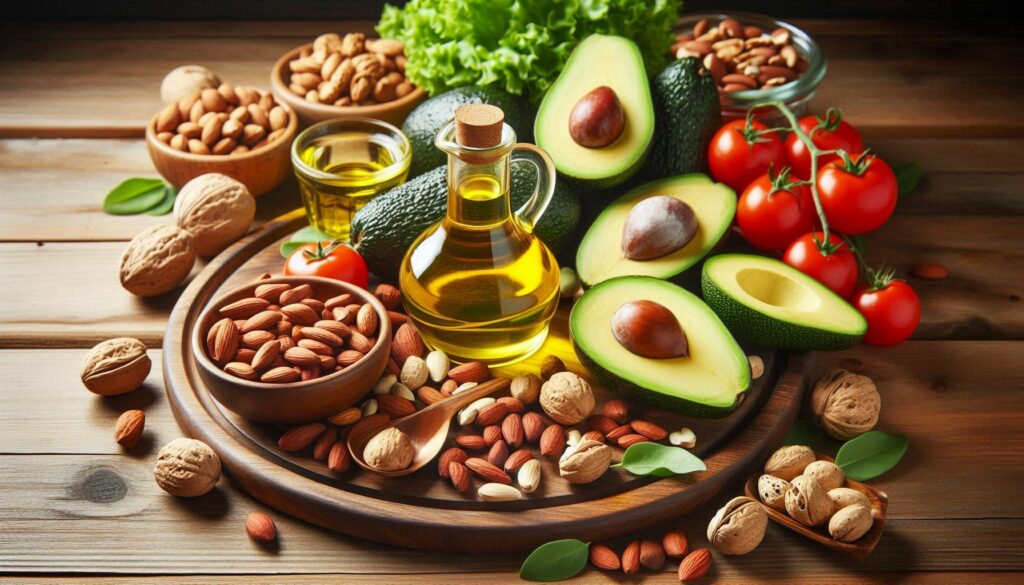
With peanut butter as another great choice for healthy fats; it’s versatile too. You can throw some into smoothies or spread it on whole grain toast. It even works as a tasty dip for fruits and veggies.
Since healthy fats have lots of calories, eating them in small amounts is important so everything stays balanced in your diet. Try to get a little bit of these healthy oils or foods into every meal.
Hydration and Its Role in Weight Training
Staying hydrated is key when it comes to weight training and keeping up your performance during any exercise. Water is super important because it helps move nutrients around in your body, keeps you cool, and makes sure your joints are working smoothly. If you don’t drink enough water, you might find yourself getting tired quickly, having muscle cramps or not being able to do as well in your workouts. It’s a good idea to drink plenty of water before you start exercising, while you’re doing it, and after you finish.
While everyone’s different when it comes to how much water they need each day; a common suggestion is drinking at least 8 cups (that’s about 64 ounces) of water daily. But really listening to what your body needs—especially if feeling thirsty—and making sure to sip on some H2O regularly throughout the day can help keep those hydration levels just right for effective weight training sessions.
How Much Water Should You Drink?
Proper hydration is essential for weight training and overall health. The amount of water you should drink depends on various factors, including your hydration needs, body weight, and level of physical activity.
A general guideline is to drink at least 8 cups (64 ounces) of water per day, but individual needs may vary.
To determine your specific water intake, you can use the following formula:
- Divide your body weight in pounds by 2.2 to get your weight in kilograms.
- Multiply your weight in kilograms by 30-35 ml to get your daily water consumption in milliliters.
- Divide the result by 1000 to convert milliliters to liters.
- For example, if you weigh 150 pounds (68 kilograms), your recommended daily water intake would be approximately 2.04-2.38 liters (68 x 30/35 ÷ 1000 = 2.04-2.38 liters).
- It is important to note that your water intake may need to be adjusted based on factors such as climate, activity level, and individual hydration needs. Listen to your body’s thirst cues and drink water regularly throughout the day to maintain optimal hydration levels for weight training.
- | Body Weight (in pounds) | Body Weight (in kilograms) | Daily Water Consumption (ml) | Daily Water Consumption (liters) |
- |————————-|——————————-|————————————|—————————————–|
- | 100 | 45.5 | 1365-1592 | 1.37-1.59 |
- | 150 | 68 | 2040-2388 | 2.04-2.38 |
- | 200 | 91 | 2725-3184 | 2.73-3.18 |
- | 250 | 113.6 | 3409-3980 | 3.41-3.98 |
The Impact of Hydration on Performance and Recovery
Staying well-hydrated is key for muscle recovery and doing your best in sports or weight training. If you don’t drink enough water, your muscles might get tired faster, which can make you perform worse during exercise. Hydration is super important because it helps keep the blood flowing smoothly, ensuring that oxygen and nutrients reach the muscles that are working hard. Not drinking enough can also mess with how well your body controls its temperature, putting you at a higher risk of getting sick from the heat when exercising really hard.
It’s a good idea to drink water before, while, and after exercising to help keep yourself hydrated and aid in muscle recovery. For even better hydration results during long or tough workouts, try having drinks or snacks that have electrolytes like sodium and potassium in them. These things help balance out fluids in your body and boost hydration levels.
Pay attention to when you’re thirsty throughout the day as a reminder to drink more water so you can stay on top of your game whether it’s daily activities or intense sessions of weight training.
Supplements to Consider for Weight Training
Adding dietary supplements to your meal plan can really help when you’re into weight training. They give you extra nutrients and aid in fixing and growing muscles. A big favorite is protein powder, especially whey protein powder because it’s super easy to use and packs a lot of proteins that are key for muscle repair and growth. Whey protein gets into your system fast, which makes it perfect for recovering after you work out.
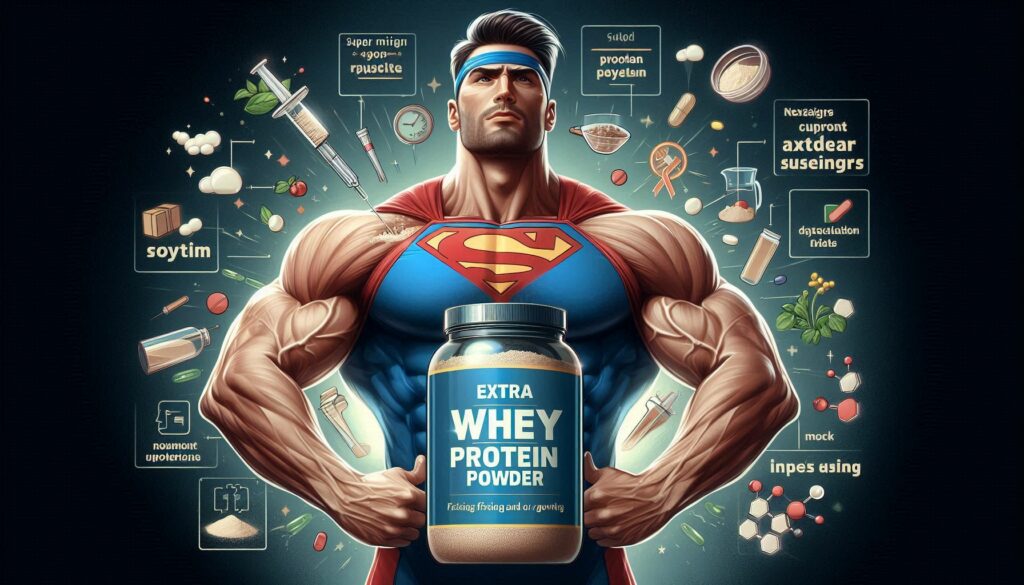
For those lifting weights, other good picks include creatine monohydrate, known for boosting strength gains, and branched-chain amino acids (BCAAs), great at easing muscle soreness while stepping up how well you perform during exercise.
But remember, these supplements aren’t meant to take the place of eating right. They should just add on to a solid meal plan paired with a proper training routine. Always talk things over with a healthcare pro or registered dietitian before diving into any new supplements.
Whey Protein: When and Why to Use It
Whey protein powder is a favorite among those who lift weights because it’s easy to use and packed with protein. It comes from milk and has lots of essential amino acids, which are the bits that makeup proteins. After you work out is one of the prime times to have whey protein. When you exercise, your muscles get stressed and tiny tears can happen in them. Having whey protein right after exercising helps start fixing these tears, aiding in muscle recovery and helping them grow.
Because our bodies soak up whey protein fast, it’s perfect for getting better after workouts. It kicks off protein synthesis too – that’s just a fancy way of saying it helps build new muscle bits.
To really get all its goodness, you should try to have some whey protein within 30 minutes to an hour once your workout is done. If you throw in some carbs with it, this combo works even better at getting your muscles back on track by filling up their energy stores again.
Creatine Monohydrate: Benefits for Strength Training
Creatine monohydrate is a well-liked supplement that’s great for folks who are into strength training. You can find it in tiny bits in foods like meat and fish, but taking extra creatine helps boost its levels in your body. This stuff gets stored up in your muscles and gives you energy when you’re doing quick, high-energy activities such as lifting weights. With more creatine from supplements, you could see better results with your strength and how much power you have during resistance exercise training.
Studies have found that adding creatine monohydrate to your routine can really ramp up muscle mass, make you stronger, and improve how well you perform exercises. It might even help speed up recovery time between sets of exercises and make the overall quality of workouts better.
When using this supplement though, it’s key to stick to the suggested amount and drink lots of water since it tends to hold onto water inside your body. Keeping hydrated is crucial here.
Common Mistakes in Meal Planning for Newbies
When you’re setting up a meal plan for weight training, it’s easy to slip up in ways that might slow down your progress. Steering clear of these common errors can really help keep you on the path to success. For starters, not paying attention to when you eat is a big mistake. Eating at the right times around your workouts can boost both energy and the availability of nutrients, making sure you perform well and recover quickly.
With meals, skipping out on variety and not getting enough micronutrients is another error folks often make. It’s crucial for your health to have a balanced diet with lots of fruits, veggies, whole grains, and lean proteins so that your body gets all the vitamins and minerals it needs.
Lastly, trying diets that are too strict or cut calories way back isn’t wise either because they can leave you feeling drained; this makes building muscle tough and could mess with how happy or healthy you feel overall.
Overlooking the Importance of Meal Timing
When it comes to building muscle and weight training, what you eat is just as important as what you eat. Eating at the right times can make sure your body has the nutrients it needs to fix and grow muscles. Before working out, having a meal or snack with carbs and protein gives you energy and makes your workout better. After exercising, eating something with carbs and protein soon after helps your muscles recover faster and grow stronger. It’s also good to have protein throughout the day in all meals and snacks for ongoing muscle repair support. Besides focusing on before-and-after exercise nutrition, eating regularly during the day keeps your energy up so that muscle growth stays steady.
Neglecting Variety and Micronutrient Intake
When it comes to meal planning for weight training, a lot of people forget about mixing things up and getting enough micronutrients. It’s really important to eat different kinds of foods that are packed with nutrients if you want to stay healthy and perform your best. Micronutrients, like vitamins and minerals, are key for making energy, helping muscles work right, and recovering after exercise. By eating lots of fruits, veggies, whole grains, lean proteins, and healthy fats, you make sure you’re getting all these tiny but mighty nutrients.
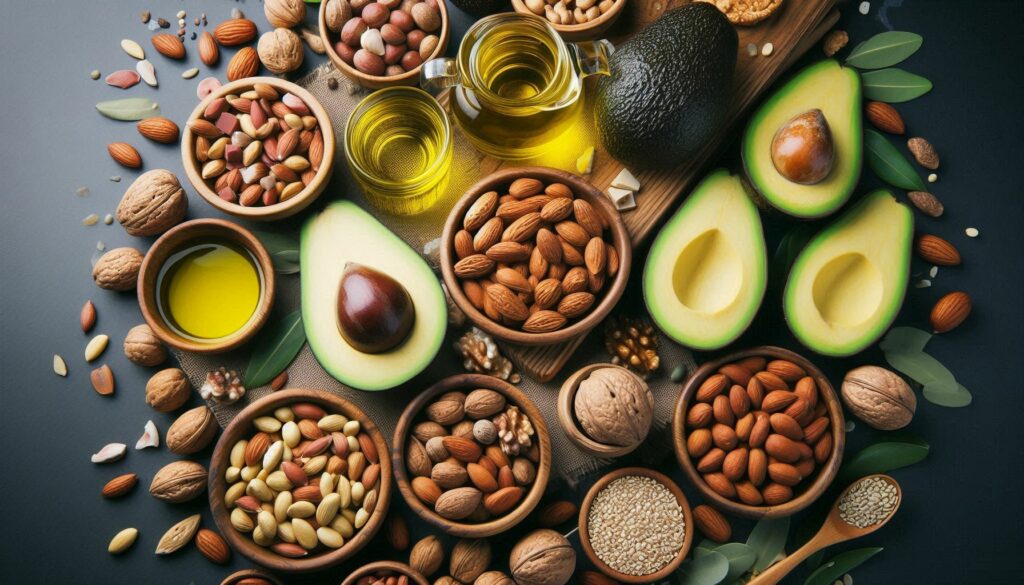
By adding fruits and vegetables of various colors to your plate, you can cover a wide range of vitamins, minerals,and antioxidants that keep you in top shape. Every color brings something unique that helps out our health big time.
It’s also crucial not just stick with one type of protein. Shake things up by including lean meats, poultry, fish legumes, and dairy products. This way, get a variety of amino acids needed for muscle growth repair. So aim balanced diet full of nutrient-dense food to help support overall health, muscle growth, and recovery during the weight training journey
Adjusting Your Meal Plan as You Progress
As you get further along with your weight training, it’s key to tweak what you eat so it fits better with the nutrition your body now needs. With progressive overload, where you slowly up how hard or much you work out, your body will need more fuel and nutrients to really help those muscles grow. Think about eating a bit more calories to both feed muscle growth and keep energy levels high for exercising. This means putting extra carbs and healthy fats on your plate.
By checking in on the balance of proteins, carbs, and fats in your diet regularly, make sure they’re still right for what you want to achieve and how active you are. Fine-tuning things like bumping up protein for building muscle or changing carb and fat amounts depending on workout intensity can really dial in that meal plan for top-notch results.
When to Increase Caloric Intake
When you’re aiming to bulk up and grow your muscles, it’s essential to eat more calories than what your body uses just for its day-to-day functions. This approach is called a calorie surplus. By doing this, you give your body the extra energy it needs not only for muscle growth but also for repairing them after workouts. It’s like giving fuel to power through exercises and providing the necessary materials so that new muscle can be built.
To figure out when it’s time to up your calorie game, keep an eye on how things are going with both how much muscle you’re gaining and how strong you feel. If progress seems slow or stalled in these areas, that might mean it’s time to increase those calories.
For advice tailored specifically to you about how many extra calories will help hit your goals without missing out on any important nutrients, talking with a healthcare professional or a registered dietitian is a smart move. They’ll make sure that as well as getting bigger muscles; all of your nutritional needs are being met too.
Modifying Macronutrient Ratios Based on Training Intensity
Adjusting the mix of protein, carbs, and fats in your meal plan based on how intense your weight training is can really help you get the most out of it. Depending on how much energy you need and what your goals are for training, you should eat different amounts of these nutrients.
When you’re doing a lot more heavy lifting or high-intensity workouts, bumping up your carb intake can give you that extra energy boost. Carbs are super important because they fuel those tough sessions and help fill up glycogen stores again.
For muscle repair and growth, keeping a steady amount of protein in your diet is key. You’ll want to aim for enough protein to make sure your muscles have what they need to build back stronger.
Including healthy fats in what you eat is also crucial since they play a big role in overall health by supporting hormone production and managing inflammation with their essential fatty acids.
By tweaking the ratios of these macronutrients when ramping up workout intensity during weight training ensures that not only does our body meet its energy demands but we also optimize performance.
Conclusion
When it comes to getting in shape and building muscle through weight training, what you eat and how you feed your body is super important. It’s all about making sure you get the right mix of proteins, carbs, and fats on your plate. Setting goals for yourself, picking out good food ahead of time, and preparing meals can really help improve how well you do in your workouts. Don’t overlook drinking plenty of water or adding things like whey protein and creatine into your diet if needed. Try not to make the mistake of eating the same old thing every day without paying attention to other important nutrients too. As you keep going with your weight training plan, remember that changing up what’s on your meal plan based on how far along you are is key for keeping up success over time.
Frequently Asked Questions
How Often Should I Change My Meal Plan?
To make sure your body keeps getting better, think about changing up your meal plan every 4-6 weeks. Pay attention to how your body reacts and change things based on that. If you switch things up too often, it might slow down your progress. On the other hand, not changing enough can cause you to hit a standstill.
Can I Still Enjoy Social Meals While Following a Meal Plan?
Sure, sticking to your meal plan doesn’t mean you have to miss out on fun meals with friends. By being a bit flexible with your diet and making smart choices, you can still enjoy social gatherings. This might mean picking healthier options, watching how much you eat, or going for alternatives that fit what you’re aiming for. With some planning ahead and eating mindfully, it’s totally possible to mix in social eating without messing up your progress.
